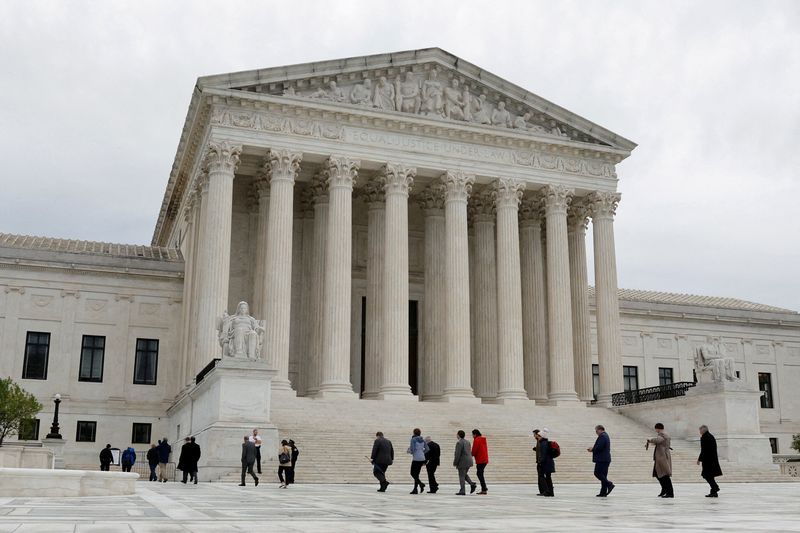By Andrew Chung and John Kruzel
WASHINGTON (Reuters) -Conservative U.S. Supreme Court justices on Monday appeared inclined to uphold a federal law that made it a crime to encourage illegal immigration, signaling agreement with President Joe Biden’s administration that the measure does not violate constitutional free speech protections.
The justices heard arguments in the administration’s appeal of a lower court’s decision in a case from California to strike down the decades-old provision, part of a larger immigration statute, as overly broad because it may criminalize legitimate speech protected by the U.S. Constitution’s First Amendment.
The case involves a man named Helaman Hansen who deceived immigrants through a phony “adult adoption” program and was convicted in 2017 of violating that law and others.
In invalidating the law, the San Francisco-based 9th U.S. Circuit Court of Appeals threw out Hansen’s conviction for violating the provision, which bars inducing or encouraging noncitizens “to come to, enter or reside” in the United States illegally, including for financial gain. The 9th Circuit upheld Hansen’s convictions on mail and wire fraud charges.
The Supreme Court has a 6-3 conservative majority. Its conservative justices appeared to agree with Biden’s administration that the law does not cover certain hypothetical scenarios that concerned the 9th Circuit, such as simply encouraging immigrants in the country illegally to remain in the United States or advising them about available social services.
The law targets only facilitating or soliciting unlawful conduct, not “general advocacy,” the administration argued.
Federal prosecutors accused Hansen of deceiving immigrants in the United States illegally by promising them between 2012 and 2016 that they could gain American citizenship through an “adult adoption” program operated by his Sacramento-based business, Americans Helping America Chamber of Commerce.
The prosecution said Hansen persuaded at least 471 people to join his program, charging each of them up to $10,000 even though he “knew that the adult adoptions that he touted would not lead to U.S. citizenship.” Hansen and his program collected more than $1.8 million through the scheme, authorities said.
“He’s victimized these people, and it may be a poster child for a situation in which the underlying offense might be modest but you might want to criminalize it because he’s taking advantage of very vulnerable people,” conservative Justice Neil Gorsuch told Esha Bhandari, a lawyer for the American Civil Liberties Union representing Hansen.
Hansen was sentenced to 20 years behind bars but is out of prison while his appeal is pending.
Conservative Justice Amy Coney Barrett voiced doubts about concerns raised by various free speech, libertarian and press advocacy groups that the law threatens attorneys, doctors, scholars and anyone else who speaks in support of immigration.
“The statute’s been on the books for a long time and there’s an absence of prosecutions. There’s also an absence of demonstrated chilling effect,” Barrett said.
The court’s liberal justices appeared to agree with the 9th Circuit’s ruling. Justice Sonia Sotomayor told Justice Department lawyer Brian Fletcher that the administration’s narrow view of the law’s real-life applications means it wants the high court to “rewrite the statute.”
“We’re criminalizing words related to immigration,” Sotomayor told Fletcher.
The 9th Circuit decision applies in the group of western states over which it has jurisdiction including Arizona and California, which border Mexico. The Denver-based 10th U.S. Circuit Court of Appeals, which has jurisdiction of a group of other states, also ruled against the law in a separate case.
Biden’s administration urged the justices to restore an “important tool for combating activities that exacerbate unlawful immigration,” particularly because of the high volume of immigration-related litigation and criminal prosecutions that occur in the states covered by the 9th Circuit.
A ruling is due by the end of June.
(Reporting by Andrew Chung and John Kruzel; Editing by Will Dunham)
